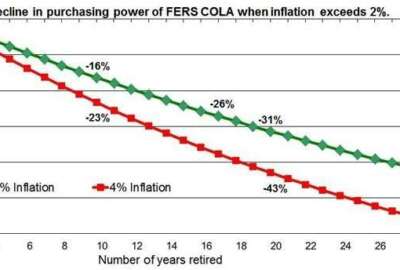Working for the federal government has its rewards and challenges. The same when you retire — a lot of options, which also means a lot of choices.
Most working feds are under both the Federal Employees Retirement System plan and Social Security. When they retire they are faced with a number of important financial decisions. Among them: When it comes to money would you prefer less sooner or more later? The answer, like so many financial decisions, comes down to: It depends.
Opting to get Social Security at age 62 means you will get the maximum number of monthly payments for life. But delaying getting a Social Security benefit means it will go up dramatically each year you wait. The maximum monthly benefit in 2020 is $2,265 for those retiring at age 62; $3,011 for those retiring at the full retirement age of 66; and $3,790 for those retiring at age 70.
So should you go for it earlier or wait to get the maximum?
The now-or-later decision is just one of many facing both active duty and retired federal civil servants. Knowing the options, and what to do with them can add tens of thousands of dollars to your retirement. And there is no one-size fits all answer. Which is why we’ll spend this morning talking to federal benefits expert Tammy Flanagan. She was a long-time fed, now retired and heading her own company.
Tammy will be my guest on today’s Your Turn radio show at 10 a.m. EST here on www.federalnewsnetwork.com or in the Washington area on 1500 AM. She’s going to answer some of the most common and complicated questions she gets including:
- What if the impact of the windfall elimination provision and government pension offset the Social Security benefit due someone under the old Civil Service Retirement System?
- What would the proposed elimination of the FERS Social Security supplemental payment mean to feds who retire or who are forced to retire before they become eligible for Social Security at age 62? Many feds — law enforcement, firefighters, air traffic controllers — are forced to retire at age 57.
- Should your long term care insurance premiums come out of your federal annuity payment or bank account?
- You’ve got a great federal health plan with Uncle Sam paying about 70% of the total premium. Should you get Medicare Part B as well? Or should you suspend, not drop, your Federal Employees Health Benefits Program coverage? How does that work?
You get the idea. The good news is that workers and retirees have a number of attractive programs and options. The question is what do they do with them? Find out today by listening to the show live. It will also be archived on our home page so you can listen anytime. If you have questions for today’s show please email them to me before show time at mcausey@federalnewsnetwork.com.
Nearly Useless Factoid
By Amelia Brust
Wheaties cereal has pretty much always been associated with athletes, but specifically due to a 1927 advertising campaign in its native Minneapolis. The cereal, made by Washburn Crosby Company and later General Mills, began advertising on the WCCO radio station in 1926, and the next year Wheaties placed an ad on the southern wall of minor league baseball’s Nicollet Park as well as sponsored the radio broadcasts of the minor league baseball team, Minneapolis Millers. The first slogan on their park billboard was “Wheaties-The Breakfast of Champions.” Baseball radio ads proved lucrative for Wheaties throughout the 1930s, with sponsored athlete testimonials and pictures on boxes following soon after.
Source: Wikipedia
Copyright
© 2024 Federal News Network. All rights reserved. This website is not intended for users located within the European Economic Area.
